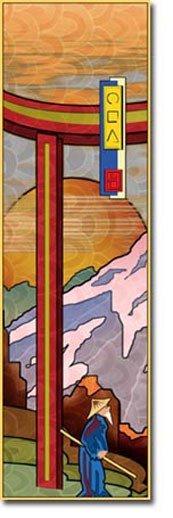On The Way: The Daily Zen Journal
True Meditation
Hakuin Ekaku (1686-1769)
What is this true meditation? It is to make everything: coughing, swallowing, waving the arms, motion, stillness, words, actions, the evil and the good, prosperity and shame, gain and loss, right and wrong, into one single koan.
Make your skirt and upper garments into the seven or nine striped monks’ robe; make your two-edged sword into your resting board or desk. Make your saddle your sitting cushion; make the mountains, rivers, and the great earth  the sitting platform; make the whole universe your own personal meditation cave.
the sitting platform; make the whole universe your own personal meditation cave.
Consider the workings of yin and yang as your two meals of gruel a day; heaven, hell, pure lands, and this world as your spleen, stomach, and intestines. Thrusting forth the courageous mind derived from faith, combine it with the true practice of introspection. Then rising or staying, moving or still, “at all times test to see whether you have lost the true meditation or have not lost it.” This is the true practice of the sages of the past and of today.
You must become aware that meditation is the thing that points out your own innate appearance. To carry on the real practice of seeing into your own nature by transcending the great matter of birth and death is by no means an easy thing to do.
Placing the essential between the two states, the active and the passive, and being in a position to be able to move in any direction, with the true principle of pure, undiluted undistracted meditation before your eyes, attain a state of mind in which, even though surrounded by crowds of people, it is as if you were alone in a field extending tens of thousands of miles.
Hakuin Ekaku (1686-1769)
excerpted from Zen Master Hakuin Selected Writings edited by Philip B. Yamplosky, 1971
Hakuin is known as the reviver of Rinzai Zen. He insisted that for Zen meditation practice, the practitioner must have three basic qualities: an over-riding faith, a great doubt when facing the koans, and a strong aspiration and perserverance.




Reading Hakuin, as with many of the old works, must be approached with a soft mind balanced with a little discernment. There is within us all a natural functioning of the mind that is capable of recognition of truth.
This natural mind is capable of instant recognition before thought arises. Just as a mirror reflects without any extra thought about what is in the mirror, so we can rest in an unpressured, uncramped mind that knows instantly before intellect arises.
Many of us have ideas about “true meditation.” Some of these ideas get in the way of true meditation and stop our sense of looking and questioning. However in the above piece several principles of practice are clearly expressed. We are encouraged to make every aspect of our life a true meditation and stop dividing the world up into important and unimportant things.
Many leave their sitting on the cushion, the assumed “important” activity. In reality we want to cultivate the mind that ceases to divide the world and give the same care to all our activities; to practice through and through until our entire life is our meditation…
If you don’t conjure up differences,
All things are of one kind.
Seeing the things of the world evenly
Restores their genuine character.
Seng-Ts’an
Looking now intently,
Elana, scribe for Daily Zen